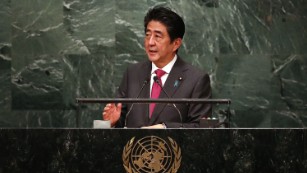North Korea’s nuclear ambitions are one of the biggest threats to international peace and security, Japanese Prime Minister Shinzo Abe warned Wednesday.
Speaking at the United Nations General Assembly in New York, Abe urged the Security Council to respond to the latest nuclear test “in a manner entirely distinct from our responses thus far.”
Pyongyang claimed a successful test of a nuclear warhead earlier this month, while this week it tested a new type of high powered rocket engine of the type that could be used for an intercontinental ballistic missile.
‘No alternative’

More than 21 ballistic missiles have been launched by North Korea this year alone, Abe said, with several of them reaching waters within Japan’s exclusive economic zone — 200 nautical miles from its coast.
“It is purely a matter of good fortune that no commercial aircraft or ships suffered any damage during this incident,” Abe said.
“There is no alternative but to say that the threat has now reached a dimension altogether different from what has transpired until now.”
He urged the UN to “indicate an unmistakable attitude to this threat.”
Will China act?
Also speaking Wednesday, Chinese Premier Li Keqiang called for the denuclearization of the Korean peninsula and the resumption of dialogue with Pyongyang.
China is North Korea’s only real ally, and has long publicly lobbied against Pyongyang’s nuclear program. Despite this, tests have proceeded, and some analysts have warned that Beijing is too concerned about the potential collapse of the North Korean regime, and the instability that would bring, to take concrete action.
Li met with US President Barack Obama this week to discuss “invigorating cooperation in the United Nations Security Council and in law enforcement channels on North Korea,” the White House said.
China needs to understand “that in the long run it is going to be less secure” if North Korea pursues its nuclear program, White House press secretary Josh Earnest said Tuesday.
‘Dirty mouths’
South Korea and US forces will conduct a mock attack on a nuclear facility next month, officials told CNN this week.
The US on Wednesday also sent two B1-B bombers to fly alongside the Korean demilitarized zone in a show of force to emphasize the “ironclad” bond between Seoul and Washington, 7th Air Force commander Thomas Bergeson said.
In a statement, North Korean state mouthpiece KCNA said Seoul’s actions were those of a regime “frightened by the daily increasing might of the DPRK,” referring to the country’s official name.
“The Park group should clearly understand that remarks made by its dirty mouths and racket of confrontation with the DPRK would precipitate its miserable destruction,” the statement said.
As reported by CNN
